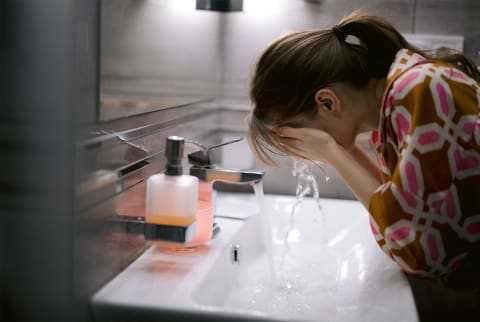Advertisement
Should You Use A Water Filter On Your Sink For Softer Skin? A Derm Weighs In


You may have heard of using a water filter on your shower head to help your hair and skin feel softer. After all, studies have shown that hard water (aka, water with high concentrations of calcium and magnesium) can decrease hair strength and increase breakage1. For that reason, it's only natural to wonder: Should I put a water filter on my sink, too?
We consulted a dermatologist on the topic to see if it's a necessary step or simply a nice-to-have. Here's what the pros recommend:
Should you use a water filter on your sink?
The main reason you'd want to use a filter on your bathroom sink is to protect the skin on your face and hands from hard water as you wash. But the thing is, hard water isn't inherently bad2; in fact, you might not even notice the hardness of your water unless you're dealing with any dry or sensitive skin concerns. While some studies suggest having a soft water filter can help mitigate atopic dermatitis if implemented early3, there isn't evidence saying that soft water filters are essential for maintaining barrier health—especially compared to other methods.
Another caveat: It depends on where you live. "Water composition varies from region to region in the United States, and water filtration systems are becoming more and more popular. However, these systems can also accumulate contaminants such as microbes," board-certified dermatologist Naana Boakye, M.D., MPH, tells mbg. That said, should you invest in a sink filter, be sure to clean it often—otherwise, it may collect even more contaminants and thus be worse for your skin in the long run.
Finally, if you're worried about water compromising your skin barrier, there are many other steps you can take to help keep it healthy. "The key to protecting the skin barrier is to take warm, short showers, use pH-balanced soaps, and apply moisturizers ideally twice a day," Boakye says. See here for our full guide to taking skin-microbiome-supporting showers.
Furthermore, moisturizing your skin right after cleansing is key. "If you wait too long, you miss that narrow window of opportunity to really trap and seal those nourishing ingredients in the skin before all the water evaporates off the surface, further compromising your skin," board-certified dermatologist Whitney Bowe, M.D., previously told mbg.
The takeaway.
If you've felt like you're missing a step by not installing a water filter on your bathroom sink, don't fret. While there are studies to show that this may help the skin barrier in some ways, there are plenty of other ways to support your skin, without an additional investment. Remember to look for pH-balanced soaps, take short, warm showers, and follow up with a moisturizer twice a day. If you're in the market for a new body lotion, we put together a list of 15 of our favorite natural options here.
